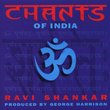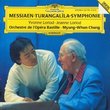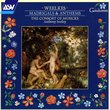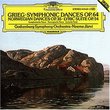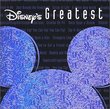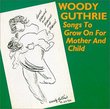| All Artists: Nikolay Medtner, Alexander Scriabin, Igor Stravinsky, Evgeny Kissin Title: Scriabin: Sonata No. 3; Five Preludes; Medtner: Sonata Reminiscenza; Stravinsky: Three Movements from Pétrouchka Members Wishing: 0 Total Copies: 0 Label: RCA Original Release Date: 1/1/2005 Re-Release Date: 9/20/2005 Genre: Classical Styles: Chamber Music, Forms & Genres, Sonatas, Suites, Historical Periods, Classical (c.1770-1830), Modern, 20th, & 21st Century Number of Discs: 1 SwapaCD Credits: 1 UPC: 828766538922 |
Search - Nikolay Medtner, Alexander Scriabin, Igor Stravinsky :: Scriabin: Sonata No. 3; Five Preludes; Medtner: Sonata Reminiscenza; Stravinsky: Three Movements from Pétrouchka
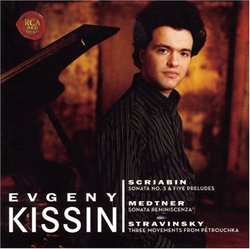 | Nikolay Medtner, Alexander Scriabin, Igor Stravinsky Scriabin: Sonata No. 3; Five Preludes; Medtner: Sonata Reminiscenza; Stravinsky: Three Movements from Pétrouchka Genre: Classical
On this record, the playing's the thing. A lesser pianist could hardly hold the listener's interest in these sonatas by Scriabin (who had messianic delusions) and Medtner (who never found much recognition outside Russia), ... more » |
Larger Image |
CD DetailsSynopsis
Amazon.com On this record, the playing's the thing. A lesser pianist could hardly hold the listener's interest in these sonatas by Scriabin (who had messianic delusions) and Medtner (who never found much recognition outside Russia), or meet the Herculean demands of the Stravinsky pieces. Scriabin's Preludes are charming, poetic, dreamy miniatures of contrasting tempo and character; the Sonata's corner movements are dramatic and fiery, the second surges, the third is lyrical and atmospheric. Scriabin attached an ambitious program, but the music speaks for itself, although in a very idiosyncratic language. Medtner's Sonata, composed when he was about to leave Russia, is romantically tuneful, melancholy and ruminative, with a feeling of nostalgia and perhaps anticipated homesickness. Stravinsky's transcription of the Petrouchka excerpts, written for Arthur Rubinstein, are among the most hair-raising bravura pieces in the repertoire. It is hard to believe that ten fingers can negotiate these torrents of notes, clusters of chords, leaps and runs. Kissin's virtuosity is not only spectacular but seems entirely effortless; his right hand literally does not know what his left hand is doing as they simultaneously produce different rhythms, articulation, and dynamics. Perhaps even more remarkable are his sense of poise and balance, his emotional range, his ability to change mood and character instantly. His tone is invariably beautiful; his control of volume, touch, color, and inflection can give it a gossamer delicacy and a radiant shimmer; even at its most forceful and percussive, it never sounds harsh. --Edith Eisler Similarly Requested CDs
|
CD ReviewsThis is a must-have recording Malcolm Saldanha | Washington, DC | 10/09/2005 (5 out of 5 stars) "I heard Evgeny Kissin play all of the works on this disc in two separate concerts. Like the live accounts, they are played about as well as is humanly possible to play them (and then some). Most of Scriabin's music is something of an acquired taste - I've been trying to "get" his music for many years, but I just can't. The word 'brutal' is the only word I can think of to describe it. I know from having tried to sight read some the scores myself, that almost all of it is extremely difficult. Having said that, the Preludes and Sonata No.4 are immensely enjoyable in Kissin's hands. He practically paints the music, achieving gradations of touch and tone that make it sound better than it is. I had never heard any of Medtner's works before and this Sonata is a good introduction. The piece seems like it's on the verge of breaking out into Chopin's style of lyricism, but not quite getting there. I found Kissin's playing of it to be completely convincing. And again, his tone throughout is really beautiful. Right from the beginning, Petrushka is all glitter and dazzle and Kissin milks it for all it's worth. His technique is so amazing that I found myself asking: how is is possible for anyone to play like this? I had the same reaction when I heard him play it at his last recital in DC. Part of the reason that I give this CD such high marks is the recorded sound itself. It's just about ideal: resonant, without any harshness in tone (except when the music requires it). " Phenomenal Stravinsky, worth the price of admission alone Brent Arnold | IL | 01/25/2006 (5 out of 5 stars) "Scriabin is generally less accessable to listeners because of the composer's later style. Nonetheless, works such as the Ninth Sonata "Black Mass" and the progressive Fifth Sonata are frequently performed. It's no surprise, however still disappointing, that Kissin sticks to earlier works by Scriabin. Sonata No. 3 is probably the most accessible work by the composer. Nonetheless, Kissin delivers a spectacular performance of the work. You will notice when you first hear the first movement, you will be gripped by it almost instantly. This work was practically written for Kissin. My only complaint about the performance is that the last movement gets a little bit out of control in terms of clarity with Kissin's intensity, but not too much so. Nevertheless, I would say this is the definitive recording of this work. I wish that Kissin had selected something other than the set of preludes included on this disc. They are beautifully played, but not one of the more interesting works by Scriabin. It is filler. Selected etudes from Op. 8 would be be better, particularly a rendition of the d# minor etude. I'm not really that opinionated on the Medtner piece. It is well played, but I don't expect people will be buying the CD for that piece alone. If you're looking for the standard for the Medtner piece, look for the Gilels recording. The main reason I bought this CD was for the Stravinsky Petrouchka. Until now, I had felt that the standard for this work was Pollini's well-known recording on DG. Kissin achieves an impressive palette of sound in his performance. It's much more interesting to listen to than the cold Pollini rendition. It achieves a great balance between Pollini's technical perfection, which Kissin achieves or surpasses even, and Gilel's color. To summarize: Spectacular recordings of both the Stravinsky Petrouchka and the Scriabin Sonata. Highly recommended. However, don't expect much change from the usual Kissin formula." Bravo, Zhenya! Concert Pianist | Canada | 04/09/2006 (5 out of 5 stars) "When the host of CBC Radio "Sound Advice" Rick Phillips played few extracts from this CD, I was intrigued. When he gave it 3 stars, I was even more intrigued - it certainly didn't make any sense. And in order to have a clear picture I got this recording and listened to it.
This CD is a success! Kissin catches well Skryabin's style, sensuous on the one hand and impulsive on the other. Third Sonata is nicely structured and its slow movement mesmerizes. Skryabin's preludes, made of crystal, are little orchid-like gems. Medtner's piece has beautiful moments, nice touch in lyrical episodes. The interpretation of Stravinsky is simply incredible! You forget it's a piano - colors, timbres, steel rhythm, excellent conducting thinking - you have a full orchestra and the Bolshoi Theatre ballet in front of you. Kissin's pianism is impressive, nothing escapes his sensitive ear. I give it 5 stars. Excellent work! " |

 Track Listings (13) - Disc #1
Track Listings (13) - Disc #1